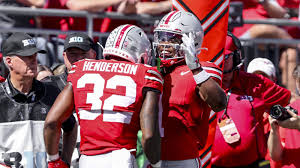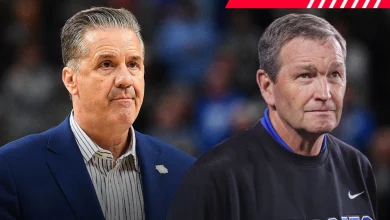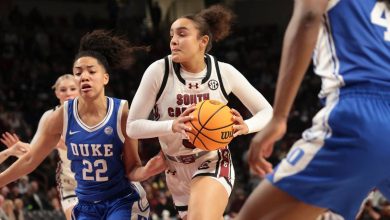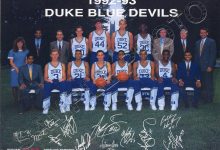Mike Krzyzewski picks the greatest player in Duke basketball history without hesitation.
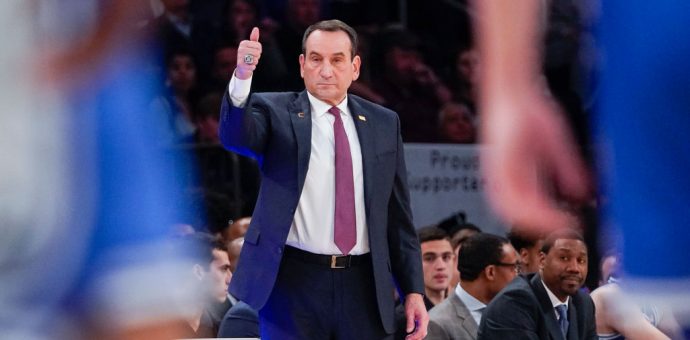
In the pantheon of college basketball greatness, few names shine as brightly as that of Mike Krzyzewski. Over a career spanning more than four decades, “Coach K” built Duke into a juggernaut, capturing five national championships, reaching 13 Final Fours, and producing a staggering number of NBA players, All-Americans, and legendary collegiate athletes. Yet, with a résumé that includes mentoring the likes of Grant Hill, Zion Williamson, Jayson Tatum, Kyrie Irving, Christian Laettner, and Shane Battier, it would seem impossible for Krzyzewski to single out just one name.
But when asked who stands atop the mountain of Duke legends, Coach K doesn’t flinch.
“Christian Laettner,” he said without hesitation. “He’s the greatest player in Duke basketball history. Period.”
For a man who spent his entire coaching career measuring moments, evaluating talent, and managing egos under the harshest spotlight, Krzyzewski’s certainty is striking. It’s not merely sentiment or nostalgia—it’s backed by numbers, trophies, and a legacy that transcends statistics.
Christian Laettner’s name is still synonymous with winning at the college level. He was the ultimate winner—dominant, clutch, and mentally unshakeable. From 1988 to 1992, Laettner led Duke to four straight Final Fours, three national championship games, and two national titles (1991 and 1992). He remains the only player in NCAA history to start in four consecutive Final Fours.
His career numbers are remarkable:
- 2,460 points (most in Duke history at the time of graduation)
- 1,149 rebounds
- 145 blocks
- 57.6% field goal percentage
- 82.4% free throw percentage
But perhaps the most astonishing stat of all? In 23 NCAA Tournament games, Laettner averaged 18.3 points, 7.8 rebounds, and shot a mind-blowing 75.9% from the field during his senior tournament run—culminating in one of the most iconic moments in sports history.
March 28, 1992. Duke vs. Kentucky in the NCAA East Regional Final.
Laettner’s buzzer-beater—catching Grant Hill’s full-court pass, faking right, turning left, and nailing a fadeaway jumper at the horn—is permanently etched into the fabric of March Madness folklore. It wasn’t just a game-winner. It was the game-winner. The shot secured Duke’s place in its third straight Final Four and is still widely considered the greatest moment in college basketball history.
Krzyzewski has reflected often on that moment, not only for its execution but for what it said about Laettner’s mindset.
“Christian never doubted himself. He was a cold-blooded competitor. I’ve never coached a college player with more confidence and poise in pressure situations,” Coach K once told ESPN. “That Kentucky game was just the final stamp. That was Christian Laettner in a nutshell—ice in his veins, execution under fire, and a will to win that was second to none.”
While many of Duke’s stars dazzled in one or two seasons before heading to the NBA—think Zion Williamson, Kyrie Irving, or even RJ Barrett—Laettner stayed all four years. His sustained excellence and leadership set the tone for what Duke basketball would become.
Krzyzewski often points to Laettner’s discipline and relentless drive in practice. “He wasn’t just great in games,” he said. “He was the heartbeat of our program every day. Whether it was a Tuesday in January or the Final Four in April, Christian showed up to dominate. He held others accountable. He made our program believe that winning wasn’t a hope—it was an expectation.”
It’s no accident that during Laettner’s tenure, Duke transformed from a talented team into a feared dynasty. He was Coach K’s first transcendent star—a bridge between potential and fulfillment.
Of course, Laettner’s greatness has always come with an edge. He was brash, cocky, and unapologetically intense. Opponents hated playing against him. Fans of other programs despised his confidence and his smirk. But Krzyzewski believes that edge was critical to Duke’s rise.
“We don’t win those championships without Christian’s toughness,” Krzyzewski once remarked. “He was willing to take on the villain role. He thrived in it. That allowed the rest of our team to play free, to compete with confidence. He welcomed the spotlight, and he never blinked.”
Indeed, Laettner’s impact went beyond the box score. He redefined Duke basketball’s identity during the early ’90s—turning the Blue Devils from a respected program into a national brand. He made Duke both admired and loathed, a level of notoriety that usually comes with greatness.
Perhaps the greatest external validation of Laettner’s place in basketball history came in 1992, when he was named to the original Dream Team—the only collegiate player selected to join legends like Michael Jordan, Magic Johnson, and Larry Bird. That selection didn’t come by accident. It was recognition of Laettner’s dominance at the college level and a nod to the respect he commanded nationally.
“He deserved that spot,” Coach K has maintained. “He earned it.”
When you compare Laettner’s legacy to other Duke greats, the case becomes even more compelling:
- Grant Hill was more versatile and had a longer NBA career, but he didn’t match Laettner’s collegiate dominance or hardware.
- Jay Williams was electric, but only had two years of peak impact.
- J.J. Redick became Duke’s all-time leading scorer but never won a national championship.
- Zion Williamson was the most physically dominant player Coach K ever coached, but only played one year.
- Shane Battier was a brilliant leader and defender, and won a title in 2001—but even he acknowledged, “Laettner’s résumé is unmatched.”
- Johnny Dawkins, the player who started Duke’s resurgence in the ’80s, paved the way—but Laettner brought it to full bloom.
Krzyzewski sees Laettner not just as a great player, but as the foundational piece of a dynasty. “Without Christian, Duke is not Duke,” he once said. “He put us on the map in a different way. His impact is forever.”
Krzyzewski and Laettner didn’t always see eye to eye. Their relationship was often intense, built on high expectations and mutual respect. Laettner has admitted he could be difficult to coach. But he always listened, always worked, and always delivered.
“Christian challenged me as a coach,” Krzyzewski said. “But I welcomed that. He was emotional. He was fiery. He wanted to win at all costs. And that’s the kind of player you go to war with.”
Laettner, for his part, has always credited Coach K for shaping his toughness. “He didn’t let me off the hook,” Laettner told The Athletic. “He demanded more from me than anyone ever had. And because of that, I became who I was supposed to be.”
Today, as Duke’s program continues to thrive under Jon Scheyer, the shadow of Christian Laettner still looms large. His jersey hangs in the rafters of Cameron Indoor Stadium. His highlights still play on video boards before tip-off. And his name remains the measuring stick for every Blue Devil who puts on the uniform.
When Coach K announced his retirement in 2021, many wondered which player most symbolized his incredible career. While Coach K was careful not to diminish others, he never hesitated when naming his greatest.
“Look at the banners. Look at the moments. Look at the legacy. Christian Laettner is the greatest player I’ve ever coached at Duke,” he said.
It’s not just a reflection of stats or championships. It’s a testament to influence. To leadership. To impact. Laettner wasn’t just a player—he was a force of nature who helped mold the modern face of college basketball.
In the world of Duke basketball, where excellence is the norm and history is deep, being named the greatest is an honor of immense weight. And for Mike Krzyzewski, who shaped that history with unmatched precision and care, the answer is clear.
“I’ve coached Olympians, Hall of Famers, and NBA champions,” Coach K once said during an ESPN special. “But in college, with everything on the line, there was no one I’d rather have than Christian Laettner. He’s the greatest Duke player of all time.”
No hesitation. No debate. Just truth from the man who built the house that Laettner helped crown.



